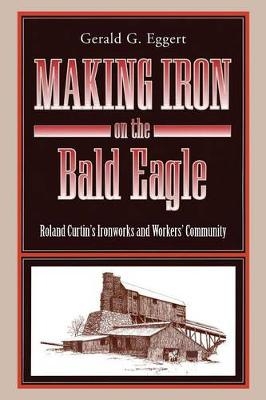
Making Iron on the Bald Eagle
Roland Curtin’s Ironworks and Workers’ Community
Seiten
2015
Pennsylvania State University Press (Verlag)
978-0-271-06711-7 (ISBN)
Pennsylvania State University Press (Verlag)
978-0-271-06711-7 (ISBN)
- Lieferbar (Termin unbekannt)
- Versandkostenfrei
- Auch auf Rechnung
- Artikel merken
The long history of the Curtin family's Eagle Ironworks mirrors both the rise and the long decline of American charcoal-iron production. Eggert's story begins with Curtin’s arrival in the Bald Eagle Valley in 1797, from the time he constructed his first forge on the bank of Bald Eagle Creek, until the final closing of the Eagle Ironworks in 1922.
In 1810, Irish immigrant Roland Curtin launched a charcoal ironmaking operation in central Pennsylvania that continued for 110 years. Through this engaging account of Curtin and his iron plantation, Gerald Eggert provides an important chapter in the history of the iron industry in America. Eggert's story begins with Curtin’s arrival in the Bald Eagle Valley in 1797. From the time he constructed his first forge on the south bank of Bald Eagle Creek until the final closing of the Eagle Ironworks in 1922, Roland and his sons, then his grandsons, and still later a great-grandson operated what had become one of Centre County's major enterprises. Throughout much of its history, the Eagle Works employed between 100 and 200 full- and part-time workmen.
Eggert analyzes the workforce and describes life in the workers' village. The relationships, lifestyles, and housing of the Curtins, in contrast to those of their employees, offer insights into the social history of the period. Eggert also provides an excellent summary of the ironmaking process—from the cutting of wood and making of charcoal to the mining of ore and smelting of the iron—and the challenges of transporting iron products out of the frontier to Pittsburgh and Philadelphia.
The long history of the Curtin family's Eagle Ironworks mirrors both the rise and the long decline of American charcoal-iron production. Typical of the small, family-owned enterprises that bridged the gap between preindustrial and modern industrial production, the history of the Eagle Ironworks illustrates both the industrializing and, later, the deindustrializing processes and the impact these had on all who were involved. When the Eagle Ironworks closed in 1922, it was the last charcoal-iron establishment in Pennsylvania and one of the two or three last such works in the United States.
In 1810, Irish immigrant Roland Curtin launched a charcoal ironmaking operation in central Pennsylvania that continued for 110 years. Through this engaging account of Curtin and his iron plantation, Gerald Eggert provides an important chapter in the history of the iron industry in America. Eggert's story begins with Curtin’s arrival in the Bald Eagle Valley in 1797. From the time he constructed his first forge on the south bank of Bald Eagle Creek until the final closing of the Eagle Ironworks in 1922, Roland and his sons, then his grandsons, and still later a great-grandson operated what had become one of Centre County's major enterprises. Throughout much of its history, the Eagle Works employed between 100 and 200 full- and part-time workmen.
Eggert analyzes the workforce and describes life in the workers' village. The relationships, lifestyles, and housing of the Curtins, in contrast to those of their employees, offer insights into the social history of the period. Eggert also provides an excellent summary of the ironmaking process—from the cutting of wood and making of charcoal to the mining of ore and smelting of the iron—and the challenges of transporting iron products out of the frontier to Pittsburgh and Philadelphia.
The long history of the Curtin family's Eagle Ironworks mirrors both the rise and the long decline of American charcoal-iron production. Typical of the small, family-owned enterprises that bridged the gap between preindustrial and modern industrial production, the history of the Eagle Ironworks illustrates both the industrializing and, later, the deindustrializing processes and the impact these had on all who were involved. When the Eagle Ironworks closed in 1922, it was the last charcoal-iron establishment in Pennsylvania and one of the two or three last such works in the United States.
Gerald G. Eggert is Professor Emeritus of History at Penn State University. His publications include Harrisburg Industrializes: The Coming of Factories to an American Community (Penn State, 1992) and the pamphlet "The Iron Industry in Pennsylvania," published by the Pennsylvania Historical Association.
| Erscheint lt. Verlag | 15.5.2015 |
|---|---|
| Reihe/Serie | Keystone Books |
| Zusatzinfo | 6 Illustrations; 1 Maps; 15 Halftones, black and white |
| Verlagsort | University Park |
| Sprache | englisch |
| Maße | 152 x 229 mm |
| Gewicht | 318 g |
| Themenwelt | Literatur ► Biografien / Erfahrungsberichte |
| Sachbuch/Ratgeber ► Geschichte / Politik ► Allgemeines / Lexika | |
| Geschichte ► Allgemeine Geschichte ► Neuzeit (bis 1918) | |
| Geisteswissenschaften ► Geschichte ► Regional- / Ländergeschichte | |
| Geschichte ► Teilgebiete der Geschichte ► Technikgeschichte | |
| Geschichte ► Teilgebiete der Geschichte ► Wirtschaftsgeschichte | |
| Sozialwissenschaften ► Soziologie | |
| ISBN-10 | 0-271-06711-X / 027106711X |
| ISBN-13 | 978-0-271-06711-7 / 9780271067117 |
| Zustand | Neuware |
| Haben Sie eine Frage zum Produkt? |
Mehr entdecken
aus dem Bereich
aus dem Bereich
Europa 1848/49 und der Kampf für eine neue Welt
Buch | Hardcover (2023)
DVA (Verlag)
CHF 67,20
Giordano Bruno - ein ketzerisches Leben
Buch | Hardcover (2024)
C.H.Beck (Verlag)
CHF 41,85


